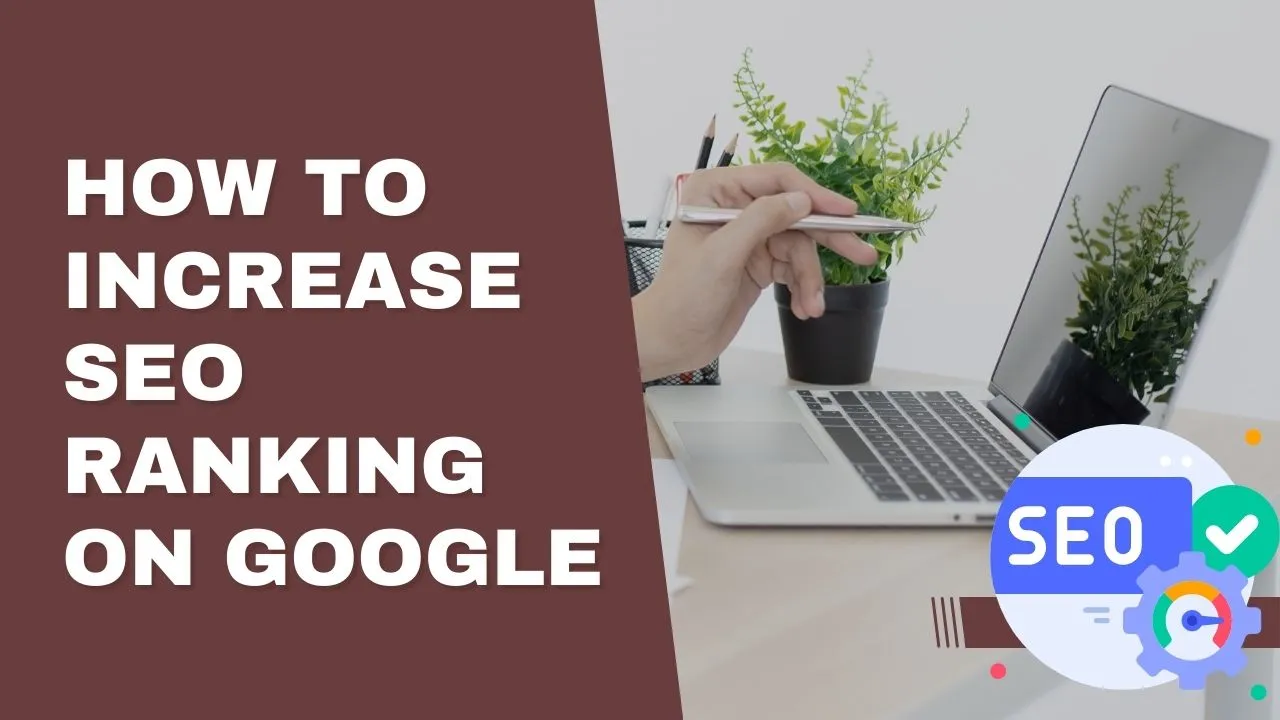In this article we will explain the step by step process for how to increase SEO ranking on google for best result.
Introduction – how to increase seo ranking on google
In today’s digital landscape, having a strong online presence is essential for businesses and individuals alike. One of the key factors in establishing that presence is search engine optimization (SEO). By optimizing your website and content for search engines like Google, you can increase your visibility, attract more organic traffic, and ultimately grow your online reach. This article will guide you through the process of increasing your SEO ranking on Google, providing you with valuable insights and strategies to improve your online visibility.
Below are the process the best way to increase seo ranking on google.
Understanding SEO Ranking
2.1 What is SEO Ranking?
SEO ranking refers to the position at which a website appears in the organic search results of search engines like Google. When users search for specific keywords or phrases, search engines analyze various factors to determine the relevance and quality of websites, ultimately ranking them accordingly. Achieving a higher SEO ranking means your website will appear higher in the search results, leading to increased visibility and traffic.
2.2 Why is SEO Ranking Important?
A high SEO ranking is crucial because most users tend to click on the top results that appear on search engine result pages (SERPs). If your website ranks lower, it may receive significantly less organic traffic. By increasing your SEO ranking, you can improve your chances of reaching a broader audience and driving more visitors to your site.
Keyword Research
3.1 Identifying Relevant Keywords
Keywords are the foundation of any successful SEO strategy. Start by identifying the keywords and phrases that are relevant to your website or content. Put yourself in the shoes of your target audience and consider what they would search for when looking for information related to your industry or niche.
3.2 Long-Tail Keywords
Long-tail keywords are more specific keyword phrases that usually have lower search volumes but higher conversion rates. By targeting long-tail keywords, you can attract highly relevant traffic and increase the likelihood of conversions. Research and include long-tail keywords in your content to boost your SEO ranking.
3.3 Keyword Competition Analysis
Conduct thorough keyword competition analysis to understand the level of competition for your target keywords. Tools like Google Keyword Planner and SEMrush can provide valuable insights into keyword search volumes and competition levels. Select keywords that strike a balance between search volume and competition to maximize your chances of ranking higher.
On-Page Optimization
4.1 Title Tags and Meta Descriptions
Title tags and meta descriptions play a crucial role in optimizing your web pages for search engines. Craft compelling and keyword-rich titles and meta descriptions that accurately represent the content of your pages. This will help search engines understand the relevance of your content and improve your click-through rates.
4.2 URL Structure
Create user-friendly URLs that include relevant keywords and are easy to read. Avoid using long, confusing URLs with random numbers or characters. A well-structured URL can enhance your website’s SEO ranking and make it more user-friendly.
4.3 Heading Tags
Use heading tags (H1, H2, H3, etc.) to structure your content. These tags provide a hierarchical structure that helps search engines understand the importance of various sections of your content. Include relevant keywords in your headings to reinforce the topic’s relevance.
4.4 Keyword Placement
Strategically place your target keywords throughout your content. However, ensure it’s done naturally and does not compromise the readability or user experience. Keyword stuffing can harm your SEO ranking, so focus on creating valuable and engaging content that incorporates keywords organically.
4.5 Optimized Content Creation
Create high-quality, informative, and engaging content that caters to the needs of your target audience. Optimize your content with relevant keywords, internal links, and external references to establish authority in your niche. Regularly update and add fresh content to keep your website relevant and encourage return visits.
Technical SEO

5.1 Website Speed and Mobile Optimization
Website speed and mobile optimization are crucial factors that can impact your SEO ranking. Ensure your website loads quickly across all devices and platforms, and optimize images and other media to minimize file sizes. Mobile optimization is especially important, as an increasing number of users access the internet through mobile devices.
5.2 XML Sitemaps
Create and submit an XML sitemap to Google Search Console. This file helps search engines understand the structure and organization of your website, making it easier for them to crawl and index your pages. Regularly update your sitemap to ensure search engines are aware of any changes or additions to your website.
5.3 Robots.txt
The robots.txt file allows you to control how search engine bots interact with your website. Use it to guide search engines on which pages to crawl and which to exclude. Implementing the robots.txt file correctly can prevent the indexing of irrelevant or duplicate content, improving your overall SEO ranking.
5.4 Canonical Tags
Canonical tags help address duplicate content issues that can arise from different versions of the same page. By specifying the canonical URL, you can inform search engines about the preferred version of your content, ensuring that the correct page receives the SEO benefits.
Off-Page Optimization
6.1 Building High-Quality Backlinks
Backlinks from reputable and authoritative websites play a significant role in improving your SEO ranking. Focus on acquiring high-quality backlinks from relevant sources within your industry. Develop relationships with influencers, engage in guest blogging, and create valuable content that naturally attracts backlinks.
6.2 Social Media Engagement
While social media engagement doesn’t directly impact SEO ranking, it can indirectly contribute to improved visibility and brand awareness. Share your content on social media platforms to increase its reach and encourage users to visit your website. Social signals, such as likes, shares, and comments, can also indirectly influence search engine rankings.
User Experience and Engagement
7.1 Site Navigation and Structure
Ensure your website has a clear and intuitive navigation structure. Make it easy for visitors to find the information they’re looking for with minimal effort. A well-organized website enhances the user experience and encourages visitors to stay longer, reducing bounce rates and signaling to search engines that your website provides value.
7.2 Responsive Design
In today’s mobile-dominated world, having a responsive website design is essential. Your site should adapt seamlessly to different screen sizes and devices, providing an optimal viewing experience. Responsive design improves user engagement and can positively impact your SEO ranking.
7.3 Engaging Content
Create content that captivates and engages your audience. Use a conversational tone, incorporate personal pronouns, and tell stories to make your content relatable. Encourage user interaction through comments, social sharing buttons, and calls to action. Engaging content is more likely to be shared, linked to, and referenced, all of which can boost your SEO ranking.
Monitoring and Analytics
8.1 Tracking SEO Performance
Regularly monitor and analyze your website’s SEO performance. Use tools like Google Search Console and Google Analytics to track keyword rankings, organic traffic, click-through rates, and other relevant metrics. By understanding how your SEO efforts impact your website’s performance, you can make data-driven decisions to further optimize your strategies.
8.2 Google Analytics
Set up Google Analytics to gain insights into your website’s traffic sources, user behavior, and conversions. Analyzing this data can help you identify areas for improvement and discover opportunities to enhance your SEO ranking. Monitor important metrics like bounce rate, average session duration, and goal completions to gauge the effectiveness of your SEO efforts.
Staying Updated with SEO Trends
SEO is an ever-evolving field, with search engine algorithms constantly changing. Stay updated with the latest SEO trends, algorithm updates, and best practices. Follow industry-leading blogs, attend webinars, and participate in SEO communities to keep yourself informed. Adapting your SEO strategies to match the evolving landscape will help maintain and improve your SEO ranking.
Conclusion
Increasing your SEO ranking on Google requires a comprehensive approach that includes keyword research, on-page optimization, technical SEO, off-page optimization, user experience, and monitoring. By implementing the strategies discussed in this article and staying up to date with SEO trends, you can enhance your website’s visibility, attract more organic traffic, and improve your overall online presence.
Read More about SEO Ranking here
FAQs
11.1 How long does it take to see results from SEO efforts?
The time it takes to see results from SEO efforts can vary depending on various factors such as competition, website authority, and the effectiveness of your strategies. Generally, it can take several weeks to a few months to see noticeable improvements in your SEO ranking.
11.2 Can I optimize my website without technical knowledge?
While having technical knowledge can be advantageous, there are many SEO optimization techniques that can be implemented without extensive technical expertise. By following best practices, utilizing user-friendly tools, and seeking assistance from professionals if needed, you can optimize your website even without deep technical knowledge.
11.3 Are backlinks still important for SEO?
Yes, backlinks remain an essential factor in SEO ranking. Quality backlinks from reputable websites indicate to search engines that your content is valuable and trustworthy. Focus on building high-quality backlinks from relevant sources to strengthen your SEO efforts.
11.4 Should I focus on organic or paid search results?
Both organic and paid search results have their merits. Organic search results provide long-term visibility and can generate sustainable traffic. Paid search results can offer immediate visibility and targeted traffic. It’s often beneficial to have a combination of both strategies, tailoring them to your specific goals and budget.
11.5 Is social media engagement beneficial for SEO?
While social media engagement doesn’t directly impact SEO ranking, it can indirectly contribute to improved visibility and brand awareness. Social media shares can expose your content to a wider audience, potentially leading to increased backlinks and traffic to your website. Additionally, a strong social media presence can enhance your overall online reputation and credibility.
